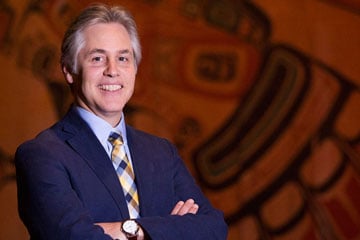
The University of Victoria is launching a four-year law program said to be the first of its kind in the world that teaches both Indigenous and non-Indigenous law to students.

The University of Victoria is launching a four-year law program said to be the first of its kind in the world that teaches both Indigenous and non-Indigenous law to students.
John Borrows, Canada Research Chair in Indigenous Law, is one of the two creators of the program and says he hopes it will encourage others to recognize Indigenous law as a reputable law and it results in producing better common law lawyers.
“It’s been my work through many years,” says Borrows, who is Anishinabe/Ojibway and a member of the Chippewa of the Nawash First Nation in Ontario.
In 1995, the idea was first raised, “but never really addressed,” says Borrows. In 2003, the first proposal was raised “but not approved.” From 2004 to today, Borrows and his colleagues have been working on developing the curriculum with the entire UVic community.
After 23 years, the program is now preparing for its first planned intake of students in September, once approved under B.C.’s Degree Authorization Act.
This act uses a quality assurance review procedure to ensure the quality of the degree and the equal value of the degree throughout various degree levels and institutions. This makes B.C. degree credits transferable in Canada and the international realm.
UVic’s brochure to promote the degree program promises four main features: the opportunity to gain field experience through collaboration with Indigenous communities, the opportunity to foster relationships with Indigenous individuals across Canada and closer to home in the province including the Songhees, Esquimalt peoples, and the W̱SÁNEĆ nations, as well as being more marketable after graduation, and fostering the knowledge and skills to change the future landscape of Indigenous law and rights.
The program also features a new “Indigenous Legal Lodge,” a publicly accessible educational resource for engagement, debate, public education and partnership on Indigenous legal traditions and relationships between Indigenous communities, Indigenous peoples and non-Indigenous individuals including students, educators, businesses, governments and judges nationwide.
Borrows says it is important to bridge the gap between Indigenous and non-Indigenous communities. One in three graduate students at UVic in law are Indigenous, and about 10 per cent of the school’s 300 Juris Doctor students are Indigenous. This program would enhance “further understanding of their heritage,” says Borrows.
He hopes the program achieves two goals.
“I hope that people recognize Indigenous law as a reputable law and I hope this will make better common law lawyers,” he says.
Though it’s been a lengthy process to establish and finalize the details of this program, “there has been universal support,” says Jeremy Webber, dean of UVic Law. “In fact, not one person has opposed it,” he says.
Three days following the B.C. budget on Feb. 20 — which included funding for this program — the university’s law program received 58 calls from interested students.
“The interest from students is incredible,” Webber says. “It’s clear it will speak to people who are interested in law school and in engaging deeply with the Indigenous community.”
Webber admits that the program is ambitious, but he is excited for September to start with the students and faculty ready to start engaging with the Indigenous community and is even more excited thinking about the future, “when we’ll see a transformative impact when graduates put their education to use and do amazing things.”